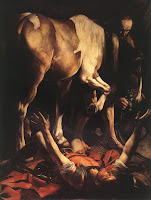Struck Blind on the Damascus Road
By Jake Wilson
April 16, 2010
Acts 9.1-20
The conversion of Saul provides us with the New Testament example of a conversion experience. Saul’s transformation from a persecutor of the Lord to an Apostle continues to serve as a word of hope to the sin soaked conscience of those who feel that truly their failings are too great to be forgiven. The story of Saul’s conversion gives narrative power to the concept of being “born again” from John 3 or becoming a “new creation” from 2 Corinthians 5.
The power of this experience transformed the murderous Saul and immeasurably impacted the Christian faith. Indeed powerful personal experiences of God have dramatically altered the direction of ‘the Way’ more than once. Remember that Luther shuddered under the righteousness of God until he came to understand the true meaning of the phrase, at which time he said “I felt that I was altogether born again, and had entered paradise itself through open gates.” We can also call to mind the conversion experience of John Wesley who claimed his heart was strangely warmed and recorded in his journal “I felt I did trust in Christ, Christ alone for salvation, and assurance was given me that he had taken away my sins, even mine, and saved me from the law of sin and death.” (Italics original)
That we live in a cultural age in which rampant individualism is one of the primary forces working against the witness of the Church should not cause us to completely abandon the langue of a conversion experience. Powerful personal encounters with the risen Christ do occur as Luther and Wesley help us remember. Still, if we are to proclaim the Gospel responsibly in our current cultural climate the preacher must temper the language of individual experience with a much thicker understanding of conversion. Fortunately, the text takes us in just such a direction.
For example, Saul’s conversion marks a change of communities. The text indicates this in a number of ways. Fruitful contrast may be drawn between ‘The Way’ of vs.2 and ‘his way’ of vs.3 (ESV; The TNIV reads ‘his journey’). Saul is on his way, with orders from the leaders of one community, before his direction is changed and he joins The Way where he receives a new brother and is initiated into a new community through the laying on of hands, receiving the Holy Spirit and baptism.
While Saul’s conversion does represent a powerful personal experience, this personal encounter is not for Saul’s sake but for the healing of the nations. As Jesus makes clear in vs.15, Saul is to become God’s Apostle to the Gentiles. The power of this encounter is not Saul’s inner experience but God’s determination to see that “at the name of Jesus every knee should bow, in heaven and on earth and under the earth.” (Phil. 2.9-11)
It is also important to note that Saul’s conversion is not a heroic individual decision. The language of asking Jesus to become one’s “personal Lord and Savior” is completely foreign to this encounter. This was not Saul’s choice. Rather he was struck down by Jesus, calling to mind the words of Hebrews 10.31 “It is a fearful thing to fall into the hands of the living God.”
In Live to Tell: Evangelism for a Postmodern Age, Brad Kallenberg offers a definition of conversion as “the change of one’s social identity, the acquisition of a new conceptual language, and the shifting of one’s paradigm.” (32) All three of these aspects are present in the text. Saul’s social identity changes as he moves from one community to another. He begins to learn a new language as he confesses Jesus as Lord even before he understands what such a confession might mean. And his paradigm is radically altered as he comes to see that the Jesus who was once a failed messiah is truly the Son of God (vs. 20). All of this stems from the power of this road to Damascus experience. Nevertheless the significance of the event, as would eventually be the case with Luther, Wesley and countless others, transcends Saul’s individual experience.
